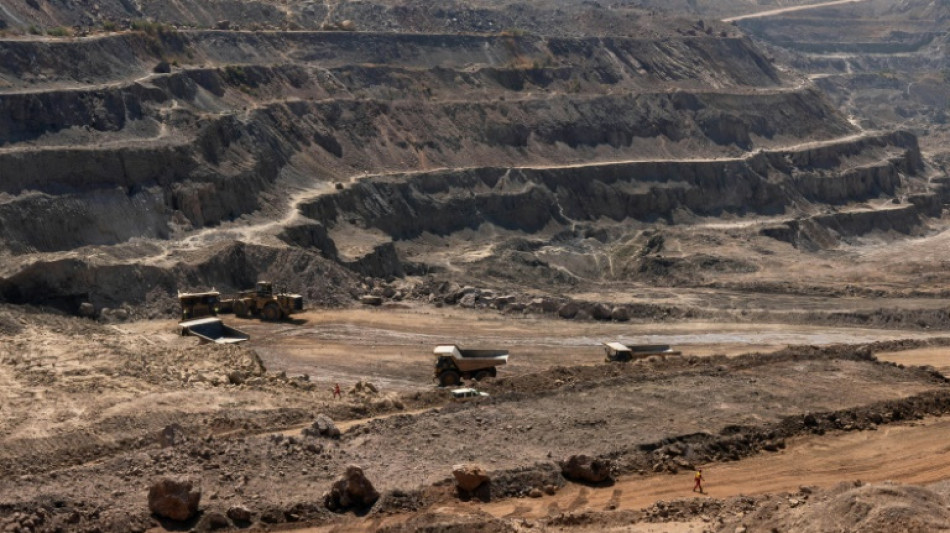
Clean energy drives massive BHP takeover bid

BHP's multi-billion-dollar bid to buy rival Anglo American promises to be the largest mining merger deal in decades, and one driven by the race for cleaner energy and green metals.
Analysts say the rationale behind BHP's near US$40 billion bid can be summed up in one word: copper.
A ready conductor of heat and electricity, copper has long been used in wiring, piping, industrial machinery and roofing.
But today it is increasingly used in solar panels, electricity networks, electric vehicles and rechargeable batteries.
Copper prices have increased about 400 percent in the past quarter century, and broke US$10,000 a tonne on Friday for the first time in two years.
Global demand is expected to grow by up to 2.5 percent a year as more plug-in electric vehicles hit the road -- they use about three times more copper than petrol or diesel vehicles.
The boom has already prompted a wave of investment, with BHP snapping up Australian copper producer OZ Minerals for more than US$6 billion last year.
Rival Rio Tinto, has invested heavily in mines in Chile, Mongolia and the United States.
BHP pitched the Anglo deal to investors Friday, saying it would improve their "exposure to future-facing commodities through Anglo American's world-class copper assets".
That might be understating it.
Buying Anglo American would give BHP control of key mines in Chile and Peru, and put it in charge of about 10 percent of world copper production.
- 'Monster' deal -
Neil Wilson, analyst at financial services firm Finalto, described it as a "monster" deal that "would create the world's largest listed miner and copper producer".
The world's largest copper deposits are found in Chile, Peru, Australia and Democratic Republic of Congo.
For BHP, Latin America seems the logical target, according to Hayden Bairstow, head of research at advisory firm Argonaut.
The firm has "sort of mopped everything up in Australia already", he told AFP, and does not appear to want to develop a massive project in Africa.
With BHP already operating two massive copper projects in Chile, they already know the terrain well.
There is a sense that Anglo American is also a juicy target -- having struggled compared with other copper mining companies.
"When you look across the copper space in general, most of the copper names are up a lot," said Bairstow. Anglo has "been a bit of an underperformer".
But the deal is far from done.
Anglo American's board on Friday rejected the initial US$38.8-billion takeover offer saying it "significantly undervalues" the firm.
In 2009 Xstrata -- now Glencore -- tried and failed to merge with Anglo American, whose investors at the time also argued the company was undervalued.
- Anglo's complex structure -
To get the deal done, most analysts expect BHP to force the sale of Anglo American's platinum, diamond and iron ore businesses -- perhaps saving only copper and a few other assets.
"They don't really want most of it," said Bairstow. "I'd argue probably the rest of the asset base would be potentially up for sale."
Spinning those non-copper assets off might be easier said than done.
Anglo is more of a conglomerate than a single company, with some complex ownership structures.
In South Africa alone it owns Anglo American Platinum, Kumba Iron Ore, and controls diamond giant De Beers.
Its platinum business in South Africa is highly politically sensitive -- with mines located in North West province, an area that is the heartland of South Africa's mining industry, but one that has been beset with political and industrial relations problems.
South Africa's mining minister -- a former Communist Party and mining union boss -- has already weighed in on the potential deal, telling the Financial Times his opinion of BHP is "not positive".
To complicate matters further, the South African government is one of Anglo's biggest shareholders.
The clock is now ticking for BHP to win over Anglo American's board and investors. Under UK competition rules it has until May 22 to design a deal.
"It doesn't leave you a lot of time to orchestrate all these things," said Bairstow.
H. Müller--BTZ

 London
London

 Manchester
Manchester
 Glasgow
Glasgow
 Dublin
Dublin
 Belfast
Belfast
 Washington
Washington
 Denver
Denver
 Atlanta
Atlanta
 Dallas
Dallas
 Houston Texas
Houston Texas
 New Orleans
New Orleans
 El Paso
El Paso
 Phoenix
Phoenix
 Los Angeles
Los Angeles



